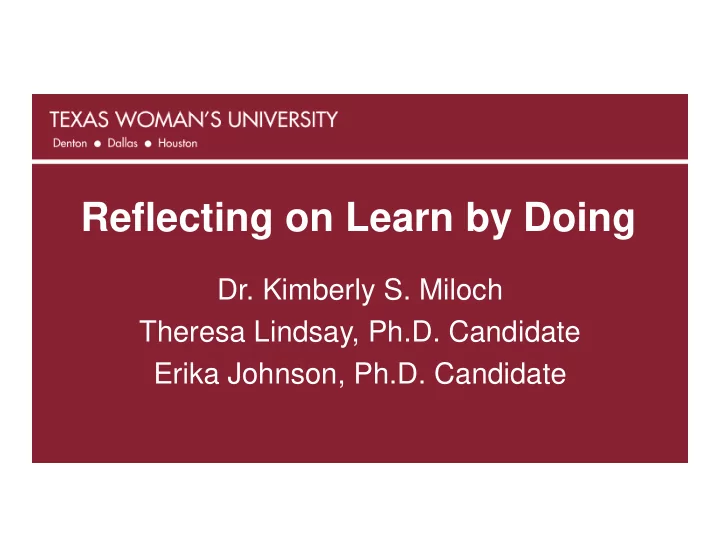

Reflecting on Learn by Doing Dr. Kimberly S. Miloch Theresa Lindsay, Ph.D. Candidate Erika Johnson, Ph.D. Candidate
Pioneering Pathways: Learn by Doing • Historical Context • Major Components • Experiential Fellows • QEP-designated courses • Experiential Student Scholars • Selection Process • Projects • Reflections • Showcase & Recognition
QEP Assessment • Student Learning Outcomes • Effectively connect classroom theories to real-world experiences through practical application of knowledge • Accurately assess knowledge and skills related to personal or professional goals including collaboration, application, and problem-solving • Assessments • F-CAPS (Direct) • Course/Project-embedded direct assessment (Direct) • S-CAPS (Indirect)
Your Pre-Reflection • What purpose do student reflections serve in your experiential learning program? • How do you currently use reflections in your programs? • What role do reflections play in your program assessment? • How can you link and align student reflections with student learning outcomes? • How can you best utilize student reflections in assessment?
Information Sharing – The Old Fashion Way • Take 5 • Multiplied by 3 = 15 minutes • Share your responses with your colleagues • What themes will emerge? • Exchange contact information
Emerging Themes from Discussion
Reflection Questions • Personal or professional goals • Relationship of goals to the specific project • Anticipated gains in knowledge or experiences as a result of the project • Anticipated collaborations with mentor, peers, or other individuals • Anticipated challenges and plans to overcome them • Anticipated application of course concepts
Emerging Themes from QEP Reflections • Experiential Student Scholar Pilot – Summer 2015 • Disciplines • Education • Kinesiology • Health Studies • Biology • Biochemistry • Nutrition and Food Science
Themes – Personal or Professional Goals • Personal • Family role model • Professional • Discipline-specific • Career advancement and acquisition of new skills • Educational attainment • Research focused and practical application • Critical thinking • Overall themes • Advocacy-focused • Community-focused, marginalized communities • Teaching and research
Themes • Challenges • Managing time • Implementing research processes • Collaborating with mentors • Applying teaching strategies
Themes • Collaboration • Importance of frequent interactions with mentor • Reliance on mentor for guidance • Utilization of alternative technologies to communicate • Teamwork is essential • Knowledge & Skill Acquisition • Critical Thinking, Creativity, and Flexibility • Applying knowledge moving forward • Overcoming challenges • Working with community partners • Advancing research and teaching tools
Themes • Key Takeaways – Students • Time management is key • Collaboration is useful • Research can be a challenge • Key Takeaways – QEP • Continuous improvement • In process • In design of reflection • Assessment • Reflections add context and value to quantitative instruments (F- CAPS and S-CAPS)
Recommend
More recommend